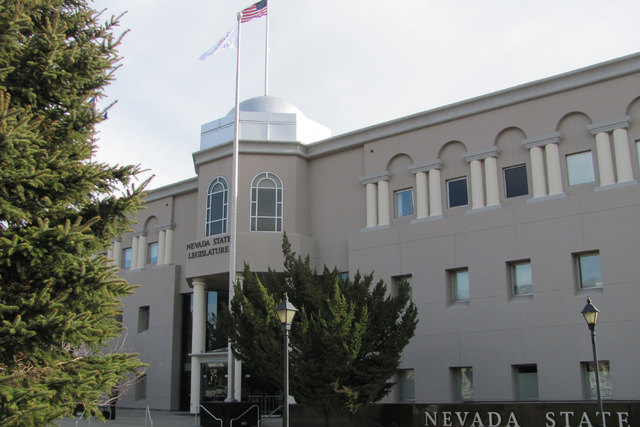Sweeping collective bargaining reform gets legislative hearing
CARSON CITY — A bill that would allow local governments to opt out of the state’s collective bargaining law was heard Tuesday in the Assembly Government Affairs Committee, where local government officials said it would give them flexibility to handle tight budgets and union representatives said it would gut recruitment and retention and jeopardize public safety.
Assembly Bill 280, sponsored by Assemblyman Erven Nelson, R-Las Vegas, is the most sweeping measure aimed at making changes to the state collective bargaining law in the 2015 session.
Nelson said he was prompted to introduce the bill because of the layoffs and position eliminations made necessary at the local government level during the recession. Because local elected officials could not always reduce benefits and pay for workers, the only options to balancing their budgets was to cut services and implement layoffs, he said.
The bill would make local government officials responsible for their budgets, just as Gov. Brian Sandoval and the Legislature are responsible for state employee salary and benefits, Nelson said.
State employees do not have the right to collective bargaining, while local government employees do.
If a local government opted out of the law, the elected officials would not have to comply with the findings of an arbitrator or fact-finder on what local pay and compensation should be, Nelson said.
The bill was endorsed by some rural government officials, including Nye and Storey counties.
Nye County Commissioner Dan Schinhofen said his county of 48,000 people has about 400 public sector employees covered by union contracts. County officials said through the years and since the recession, union salaries and benefits have grown from $2.9 million in 2011 to $3.6 million last year.
AB280, he said, would “allow us to press the pause button” to rein in expenses, Schinhofen said.
Others testifying for the bill were Jim Galloway, a former Washoe County commissioner, and Storey County Sheriff Gerald Antinoro.
But public employee representatives said collective bargaining allows management and employees to work through fiscal hardships together.
Rusty McAllister, representing the Professional Firefighters of Nevada, said labor groups worked with elected officials to renegotiate contracts during the recession.
“That took place all across the state of Nevada,” McAllister said. “They stepped up and did what they needed to do.”
Ron Dreher, representing peace officers and others, said negating public contracts would hurt recruitment and retention of employees.
“You can get a cop for a buck but you get what you pay for,” Dreher said, adding, “Please don’t do this.”
Representatives of local government public employee unions have been fighting efforts to change the collective bargaining law this session, which has seen Republicans in control of both houses for the first time since 1985.
The Assembly Commerce and Labor Committee will near another major collective bargaining reform bill in a work session today. Assembly Bill 182 by Randy Kirner, R-Reno, would make a number of changes to the law but numerous amendments are expected to be reviewed at the hearing.
As written Kirner’s bill would clarify the rules that he says already exclude supervisors from collective bargaining. It also would prohibit using government funds to pay employees engaged in union activities and prohibit government employers from collecting union deductions from their employees.
The bill also prohibits any wage or benefit increases if a contract has expired until a new agreement is finalized and eliminate binding fact-finding unless the local government entity chose to employ it, among its other provisions. It would also allow layoffs that are not based on seniority.
Contact Sean Whaley at swhaley@reviewjournal.com or 775-687-3900. Find him on Twitter: @seanw801 Contact Sandra Chereb at schereb@reviewjournal.com or 775-687-3901. Find her on Twitter: @SandraChereb

















